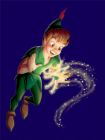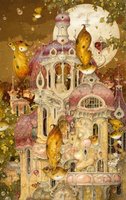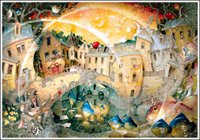I wanted to do a post of Tarot cards because of their popularity, but have been so busy at work and do not have time to write my own post. So I am posting an article by M.J. Abadie on the history of Tarot cards.
The history and theories below may not necessarily that of this blogger.
History & Mystery of Tarot
by M. J. Abadie
The Tarot has experienced a resurgence in the past two decades and has become especially popular recently, with newly minted modern Tarot decks coming out frequently. There are now dozens of decks from which to choose, representing themes from Egyptian and Celtic to Native American and Feminist.
Over time, the Tarot cards have had their ups and downs, falling from popular interest only to be once more resurrected by those in search of the deeper meanings behind their complex symbolism. As the saying goes, "Truth will always out."
The earliest known "book" of Tarot cards still in existence are those from 1840-42, of which seventeen remain. The first entire deck still in existence was painted by the Italian Bonifacio Bembo for the Duke of Milan.
Many theories exist about the origins of the Tarot. During different periods of history, occult (the word means "hidden") studies were either freely available to all or deeply secret, depending upon the prevailing authorities of the culture's attitude toward occult knowledge.
One theory is that in the great library of Alexandria in Egypt, whose female librarian Hypatia was world-renowned for her wisdom and learning, there existed scrolls (which was how books were made in those days) containing all of the wisdom of the ancient world.
One of these "books" was supposedly based on the legendary Book of Thoth, derived from the mystery schools of Egypt. The allegorical illustrations on the Tarot cards are said to contain these secret teachings, which in the Major Arcana represent a course in personal development. The esoteric teachings were hidden in the seemingly innocent pictures.
Gypsies are said to have carried the cards to Europe and "gypsy" is considered a corrupt form of "Egyptian." Considered by the Church to be "the devil's picture book", the cards were quickly condemned by the Catholic Church as heretical. Just to possess them was a dangerous act.
There seems no doubt that the cards were a means for preservation of ancient knowledge that the Church considered dangerous, or heretical, at a time when it was literally a danger to your life to believe anything other than the established Church dogma.
Though we can only speculate on its origins, the Tarot images are inextricably linked to ancient beliefs, mythologies, and religious systems such as the Hebrew Cabala. Others, notably Pythagoras, believed that letters and numbers are in themselves divine beings possessing extraordinary powers; the Greek neo-Pythagorean school taught these ideas.
No matter the origin of the Tarot, it is clear that its motifs refer directly to fundamental human psychological and spiritual experiences. The more one studies them and practices their use, the deeper one's understanding becomes, and the more they resonate to the inner life, as well as to events in the outer life. They are primarily meant to be used for enlightenment, for discovery of the authentic Self.
Number cards are believed to have been added at a later date, around the time of the first known deck in the fourteenth century. This theory suggests that they derive from an Italian card game known as tarrochi.
Though we will never know their true history, that needn't prevent us from using their wisdom, for the Tarot cards do indeed tell a powerful story: the story of the development of human life. It is an adventure story, like the hero's journey, filled with challenges, obstacles to be overcome, lessons to be learned, reconciliations to be achieved, honor to be protected, goals to be formulated and reached. In this universal story, each of us undertakes his or her own Way, following whatever symbolism speaks to us at the moment of a reading. It is this amazing flexibility that has allowed the Tarot and its marvelous symbols to endure through long and tumultuous centuries in order to come down to us today.
The Soul of the World
In the view of the alchemists and mystics, the universal significance of such symbols as the Tarot presents and preserves was thought to spring from the anima mundi, or soul of the world, which was seen as a vast repository of knowledge, like a universal library, that was filled with the memories and wisdom of the entire human race-past, present, and future. Sometimes called the "Akashic records", this source of knowledge could be accessed by anyone willing to make the effort of deep contemplation.
Within this collective pool are all the basic figures found in religions, myths, legends, and fairy tales. Taken together, these figures encapsulate a magical storehouse of profound esoteric knowledge. For example, The Empress symbolizes the essence of femininity as represented by the great mother Goddess of the world's most ancient religion. She can be seen as the representative of what Goethe called "the eternal feminine", in both myth and psychology.
Thus does each figure of the Tarot call forth from the individual's unconscious a deep resonance. Contact with these images in a conscious, intentional way allows their hidden counterparts -- denizens of the deepest layer of human collectivity -- to surface and become integrated into a person's life.
Properly conducted, a reading is a story -- the images on the cards meld into a meaningful pattern that can clarify the issues confronting the person for whom the reading is held. In a profound sense, if taken rightly, a reading can act like a vivid, enlightening dream or a moment of the flash of inspiration-the "Ah-ha" experience. "So, that's how it goes!"
Tarot cards are wonderful for meditation, as well as for divination, or the answering of questions. They act to stimulate the intuition, which is the key to the gateway of the unconscious. They act to illuminate the hidden factors in a person's life that bear on the situation at hand. Often, the person him- or herself may be unaware of these inner issues that are secretly shaping the course of his or her life. The Tarot, by contacting what is inside the person, reveals them












